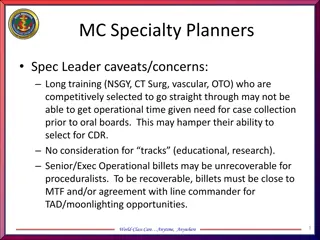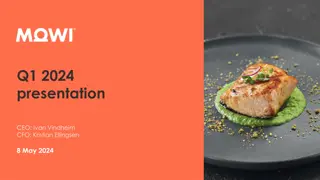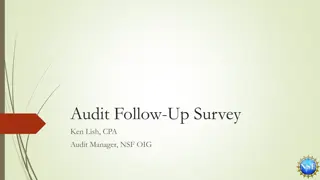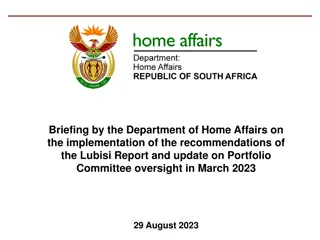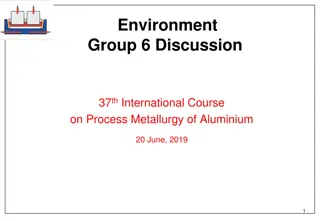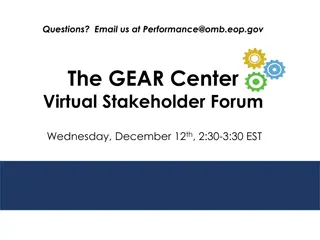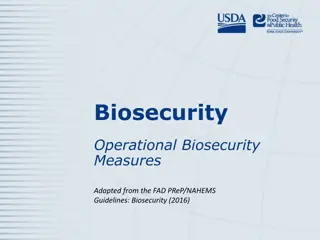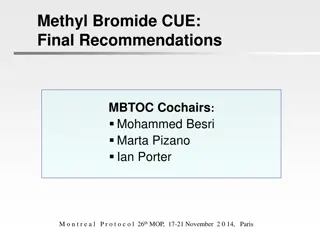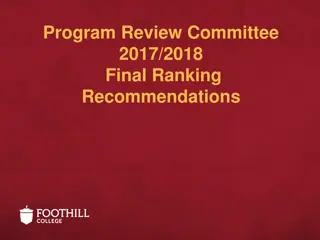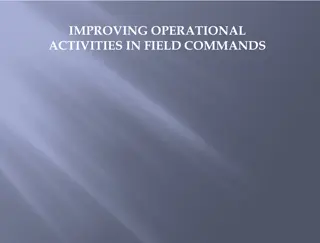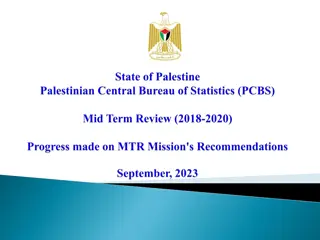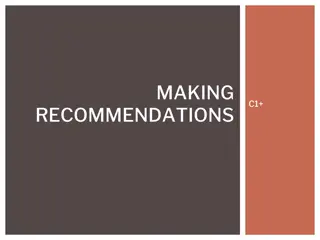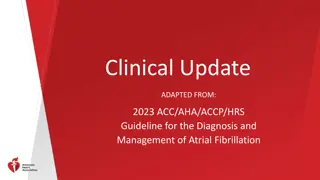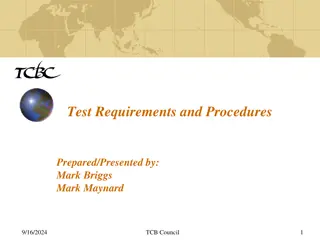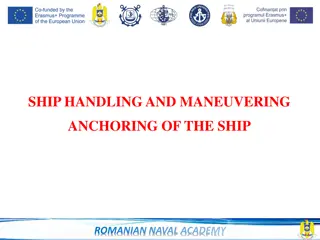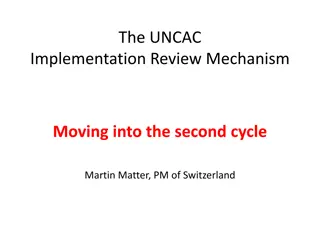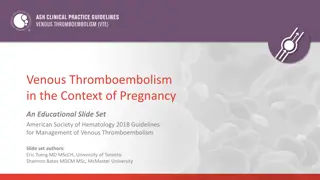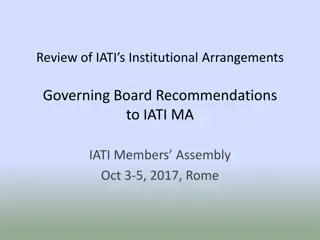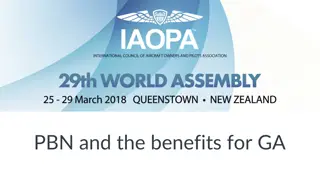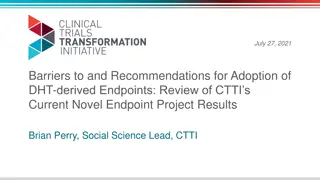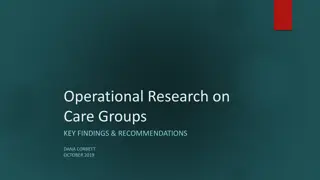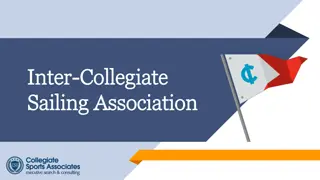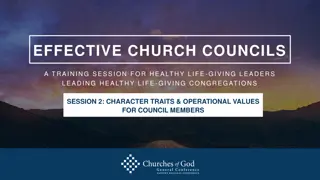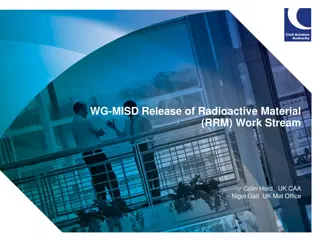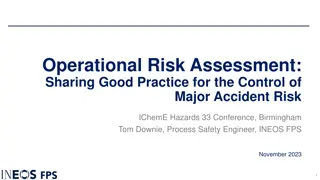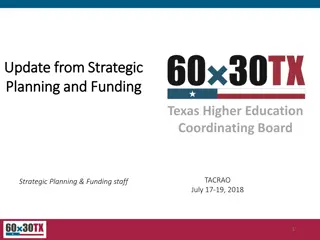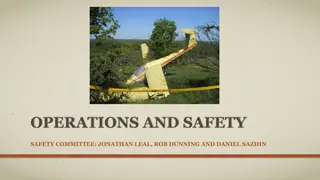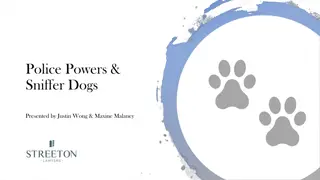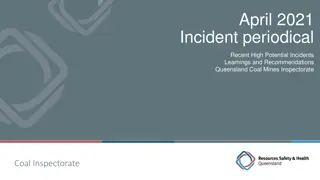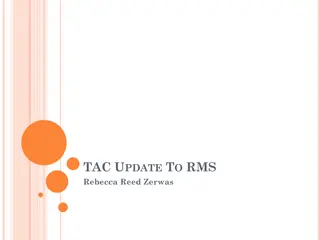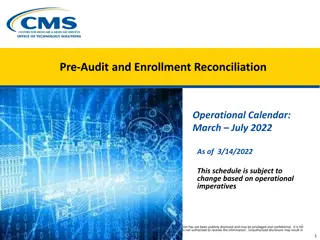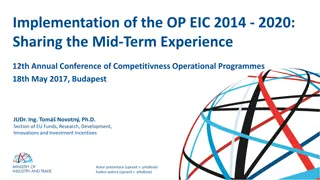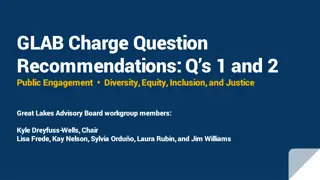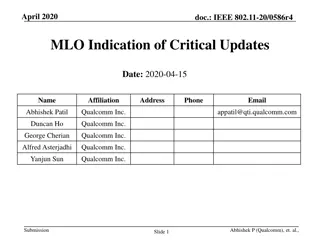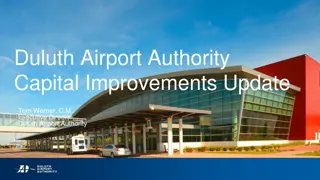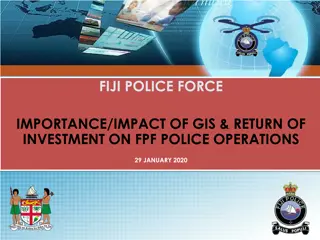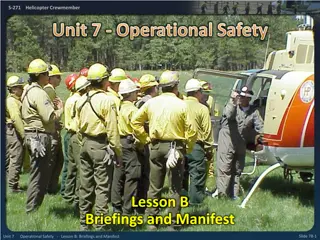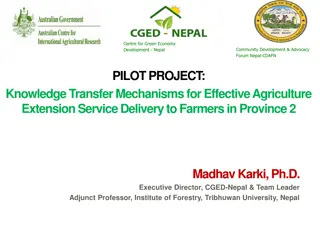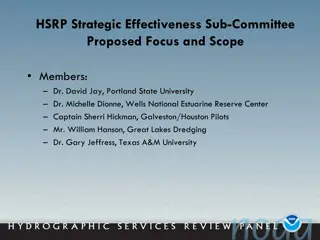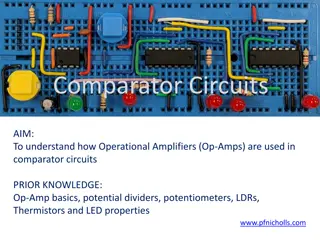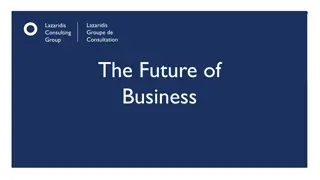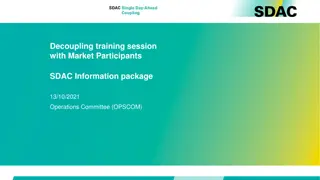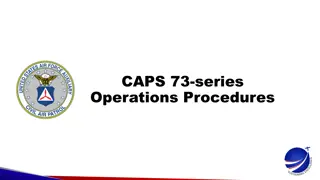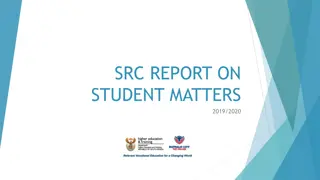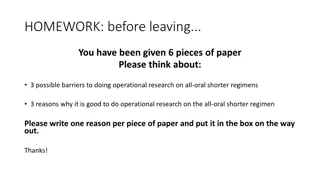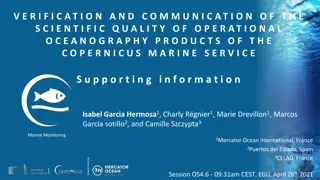Enhancing Operational Procedures of CCPR and JMPR: Challenges and Recommendations
The Codex Committee on Pesticide Residues established an Electronic Working Group to gather input on improving operational procedures. A circular letter was prepared to address the need for enhancements, opportunities, challenges, and recommendations for stakeholder workshops. Concerns include the workload on JMPR and the limited resources available, highlighting the importance of this initiative.
Download Presentation

Please find below an Image/Link to download the presentation.
The content on the website is provided AS IS for your information and personal use only. It may not be sold, licensed, or shared on other websites without obtaining consent from the author. Download presentation by click this link. If you encounter any issues during the download, it is possible that the publisher has removed the file from their server.
E N D
Presentation Transcript
CCPR CODEX COMMITTEE ON PESTICIDE RESIDUES ENHANCEMENT OF THE OPERATIONAL PROCEDURES OF CCPR AND JMPR: OPPORTUNITIES, CHALLENGES, AND RECOMMENDATIONS ON NEXT STEPS In-Session Working Group Chaired by United States of America and Co-Chaired by Costa Rica, France, Germany, and Uganda
Background The 53rd Session of the Codex Committee on Pesticide Residues (CCPR53, 2022) established an Electronic Working Group (EWG) to collect information on the need to enhance the operational procedures of CCPR and the Joint FAO/WHO Meeting on Pesticide Residues (JMPR). The EWG s terms of reference (TOR) were to: i. Prepare a circular letter (CL) to request information from members and observers on the need to enhance CCPR/JMPR and the associated opportunities and challenges. In addition, the CL may invite members and observers to consider a second or possibly subsequent workshops that would expand on and further develop some of the themes addressed in the virtual workshop sponsored by CropLife International on March 31, 2022, as described in CX/PR 22/53/20. ii. On the basis of the responses to the CL, prepare a summary of the submitted information and a discussion paper that summarizes findings for consideration at CCPR54 and later transmission to JMPR. iii. Coordinate work with related EWGs such as the EWGs on priority lists, national registration database, unsupported compounds.
EWG Circular Letter (CL 2022/75-PR) To fulfill TOR (i), the EWG prepared a circular letter to request feedback from Codex Members and observer organizations. Following two rounds of review, CL 2022/75-PR was published in January 2023 and requested information on the following: 1. The need to enhance the operational procedures of CCPR/JMPR; 2. Opportunities for enhancement (e.g., improvements to existing processes) and major reform (e.g., governance and structural changes); 3. Anticipated challenges in implementing proposed enhancements and major reform; 4. Recommendations on key topics and themes for potential stakeholder workshops; and 5. Any addition proposals and recommendations that are relevant to CCPR s discussion of enhancements.
EWG Circular Letter (CL 2022/75-PR) The circular letter also highlighted that while the current work was prompted by recent concerns, the growing demand on JMPR has been an important topic of discussion over the past 20 years. Notably, FAO/WHO commissioned a 2002 review of the working procedures of JMPR that was reviewed at CCPR34 and the JMPR 2002 Regular Meeting. Many of its findings are relevant today. modern monographs are very detailed and extend to over one thousand pages for a particular Meeting. There has been a huge increase in the quantity of scientific data submitted for evaluation, and yet the JMPR only exists for two weeks of the year, in contrast to the situation at a national regulatory authority level. Financial resources available for this work have not increased proportionally leading to the generation of a backlog of pesticides waiting for review. The current JMPR system is also very vulnerable in that it relies on the goodwill of a limited number of individuals who work on a voluntary basis. These individuals, despite being internationally recognized in their fields, have to prepare the monographs without any financial reward and usually in their own personal time.
EWG Discussion Paper (CX/PR 23/54/15) Overview To fulfill TOR (ii), the EWG prepared a discussion paper for consideration at CCPR54. A total of 15 Member Countries and 3 Observer Organizations submitted comprehensive information in response to CL2022/75-PR. Based on these comments, there was consensus in the EWG that there is a need to enhance the operational procedures of CCPR and JMPR. Discussion paper provides summary information on range of comments on potential opportunities, organized by theme, but does not endorse specific proposals. Opportunities for Enhancement Opportunities for Major Reform Sponsor Dossier/Electronic Data Submission CCPR Processes and Procedures JMPR Evaluation Process and Procedures JMPR Organizational Structure, Staffing and Resources Use of National Reviews and Data Alternative Peer Review Models Other
EWG Discussion Paper (CX/PR 23/54/15) Charge Question 1 Please comment on the need to enhance the operational procedures of CCPR/JMPR to (i) eliminate the backlog of compounds evaluations caused by the cancelation of JMPR meetings due to the COVID19 pandemic and (ii) expand its review capacity to meet the future demand. Discussion Paper Summary General consensus that there is a need to enhance the operational procedures of CCPR and JMPR to address concerns related to both JMPR current workload and future demand. Several commenters cautioned that increasing JMPR s capacity will require more than recruiting additional experts because JMPR must evaluate a range of complex issues, make scientifically sound judgments, and has limited time during its annual meetings. Range of suggestions related to the management of JMPR s workload and more clearly defining the time and resource requirements to conduct evaluations based on the experience of JMPR s experts. Suggested that number of active substances awaiting advice on supported commodities increases from year to year. As such, data submitters need to meet their commitments in a timely and comprehensive manner.
EWG Discussion Paper (CX/PR 23/54/15) Charge Questions 2/3 Please comment on opportunities to enhance the operational procedures of CCPR/JMPR to improve the efficiency of the evaluation process and increase JMPR s evaluation capacity. Please comment on the anticipated challenges and propose possible solutions. Discussion Paper Summary Data Standardization, Digital Templates, and Information Technology (IT) Timely Data Submission Current Data Submission Issues Development of Efficient Dossiers Schedule and Priority List Coordination on Risk Management Issues Criteria for Periodic Reviews CCPR Plenary Discussion on MRLs and Appropriate Scope of Interventions Timely Maintenance of the Codex Pesticide MRL Database CCPR Support for Extra Meetings Data Sponsor Dossier and Electronic Data Submission CCPR Processes and Procedures
EWG Discussion Paper (CX/PR 23/54/15) Charge Questions 2/3 Please comment on opportunities to enhance the operational procedures of CCPR/JMPR to improve the efficiency of the evaluation process and increase JMPR s evaluation capacity. Please comment on the anticipated challenges and propose possible solutions. Discussion Paper Summary Required Scope and Level of Detail in Data Sponsor Dossiers and JMPR Monographs Working Procedures Quality Control Check in Data Submission Efficiency in Virtual Collaboration JMPR Evaluation Process and Procedures Funding JMPR Experts Staffing JMPR Organizational Structure, Staffing and Resources
EWG Discussion Paper (CX/PR 23/54/15) Charge Question 4 Codex members and observers are requested to provide feedback on the focus of additional stakeholder workshops that aim to expand upon the virtual stakeholder workshop sponsored by CropLife International on March 31, 2022 and summarized in CX/PR 22/53/20. Please provide recommendations on key topics and themes for this follow-up workshop Discussion Paper Summary: Following the publication of CL 2022/75-PR, CropLife International organized two virtual stakeholder workshops on February 23rd and March 7th, 2023. Information and stakeholder input from these workshops was not summarized in discussion paper but may be of interest to both CCPR and JMPR in future deliberation. More limited comments to this charge questions were provided by EWG participants: o Future deliberation should consider 2002 review of the working procedures of JMPR. o Possible Themes related to communication, provision of scientific advice, and CCPR/CAC procedures. o Other Codex Committees may experience similar challenges. Perhaps there is merit in engaging other Codex Committees to share experiences, exchange ideas and collectively brainstorm on how to make the process more efficient across Codex.
EWG Discussion Paper (CX/PR 23/54/15) Charge Question 5 Do you have any further proposals or recommendation that are not covered by the four previous questions? Discussion Paper Summary: More limited comments on additional proposal and recommendations that were not covered by the previous charge questions listed in CL 2022/75-PR.
EWG Discussion Paper (CX/PR 23/54/15) Conclusions The EWG completed its terms of reference and proposed a two-step approach in the conclusion section of the discussion paper for consideration by CCPR54. As a first step, the EWG discussion paper will be submitted to JMPR for their consideration. At the second step, CCPR and JMPR will identify an appropriate approach to identify potential priorities and develop a roadmap for implementation. Potential approaches could include commissioning an independent third-party organization to conduct an organizational assessment or working through an existing Codex advisory body or committee.
EWG Discussion Paper (CX/PR 23/54/15) Recommendations The EWG recommends CCPR54 consider the following schedule to further advance work on this topic: First Step: 2023-2024 Second Step: 2024 and beyond CCPR54 to submit this paper to JMPR, through the JMPR Secretariat, for consideration at its regular meeting in September 2023. The paper should be accompanied with the summary of the discussion that took place at CCPR54, based on comments received in reply to CL 2023/39-PR, and any additional recommendations (if any) for consideration by JMPR. CCPR55 to consider the reply from JMPR, and, based on consultations with CCPR, Codex, and JMPR Secretariats, as well as FAO and WHO between 2023-2024, CCPR and JMPR should identify an appropriate approach to: a. identify potential priorities for enhancement and major structural reforms and b. develop a roadmap for implementing both enhancements and major structural reforms JMPR-2023 to consider the request of CCPR54 and identify initial priorities for enhancing its operational procedures and report back to CCPR55 (2024) on its recommendations and specific areas that may require guidance from CCPR.
Comments in Reply to CL 2023/39-PR Comments of Brazil, Canada, Costa Rica, Egypt, European Union (EU), Iraq, Kenya Commenters generally supportive of EWG recommendations and proposed workplan. Comments provided additional input on potential priorities for CCPR/JMPR enhancement and can be advanced to JMPR. Practical considerations raised about how to coordinate with JMPR and the availability of time at the September JMPR meeting. o Considering the importance of seeking enhancements to operational procedures of CCPR and JMPR, more time would be required at the September meeting to explore and identify initial priorities for such enhancements. One option would be to postpone the review of various new uses to the 2024 JMPR. Alternatively, FAO and WHO expert panels can dedicate a few days ahead of the regular meeting to develop a strategic plan that can serve as a framework for future changes.
Proposed Terms of Reference It is recommended that the EWG be re-established with the following terms of reference: i. Request JMPR, through the JMPR Secretariat, to consider the EWG discussion paper (CX/PR 23/54/15) at its regular meeting in September 2023. The discussion paper should be accompanied with the summary of the discussion that took place at CCPR54, based on comments received in reply to CL 2023/39-PR, and any additional recommendations (if any). CCPR requests guidance from JMPR on the following: a. General feedback on discussion paper and summary of responses on opportunities for enhancement and associated challenges; b. Recommendations on initial priorities for enhancing JMPR s operational procedures; and c. Additional considerations that require guidance from CCPR. ii. Based on the feedback from JMPR (outcome of Term of Reference [i]), explore potential approaches that may be used to identify priorities for CCPR and JMPR enhancement and develop an implementation roadmap. Potential approaches could include commissioning an independent third-party organization to conduct an organizational assessment or working through an existing Codex advisory body or committee. iii. Based on term of reference (i) and (ii), prepare a summary of recommendations for consideration at CCPR55 in 2024.


